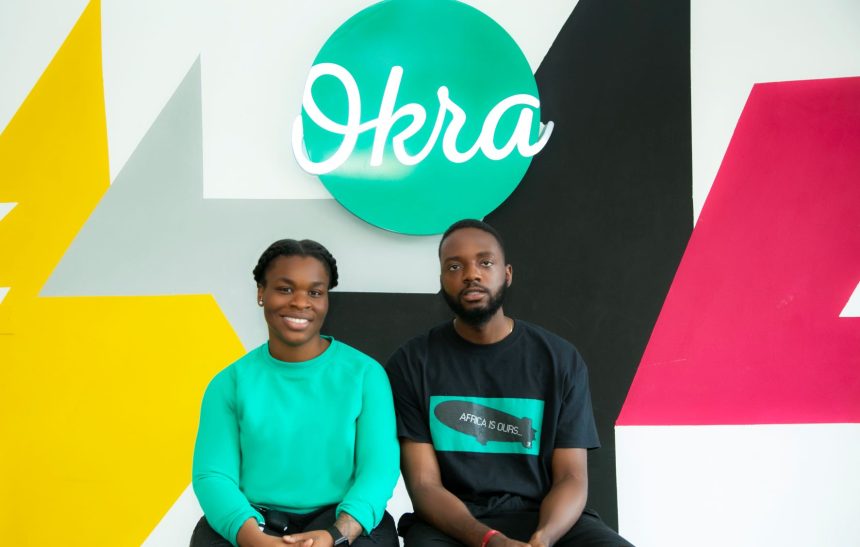Physical Address
60 Ekwema Cres, Layout 460281, Imo
Physical Address
60 Ekwema Cres, Layout 460281, Imo

Okra, a well-known Nigerian fintech startup, has shut down its operations in May 2025, citing market challenges as the main reason for its closure. This decision marks a significant moment in Africa’s fintech scene, as Okra was one of the pioneers in open banking on the continent. The company is now set to return about $5.5m in unspent funds to investors, a rare and transparent move in the startup world.
Founded in 2019 by Fara Ashiru Jituboh and David Peterside, Okra built a platform that allowed secure and real-time connections between bank accounts and third-party financial apps. This innovation helped improve financial access across Africa by enabling seamless data sharing between banks, fintech companies, and customers. Okra quickly became popular, partnering with major Nigerian banks and fintech platforms like Renmoney, Branch, Bamboo, and AIICO Insurance. Its API usage grew by 175% in one quarter in 2020, showing strong early momentum.
Read Next: Flutterwave Relaunches Send App in US with 20 More Licences
Over the years, Okra raised a total of $16.5 million from investors. This included a $1 million pre-seed round from TLcom Capital in 2020, a $3.5 million seed round in 2021 led by Susa Ventures and Accenture Ventures, and a $12 million round in 2022 led by Base10 Partners. These funds were meant to help Okra expand its open banking services across Nigeria and into other African countries like Kenya and South Africa.

However, despite this strong start and substantial funding, Okra’s shutdown was caused by market challenges that proved difficult to overcome. One major issue was the rising cost of cloud infrastructure, especially because foreign cloud services like Amazon Web Services (AWS) and Microsoft Azure charge in US dollars. With Nigeria’s currency, the naira, losing value, Okra’s operational costs increased significantly. To tackle this, Okra launched Nebula in late 2024, a cloud service priced in naira aimed at offering a cheaper alternative to expensive foreign cloud providers.
Unfortunately, the pivot to cloud services did not go as planned. Competing with global giants like AWS and Google Cloud was tough, especially since many businesses were reluctant to switch due to concerns about reliability and the high cost of change. Nebula struggled to gain enough traction for mission-critical services, which created uncertainty about its long-term revenue potential. This shift also stretched Okra’s resources and distracted from its core open banking business, which was already facing stiff competition from other fintech startups like Mono, OnePipe, and Stitch.
Despite having enough funding to continue for another three years, Okra’s leadership decided to wind down operations. Fara Ashiru Jituboh, the CEO and co-founder, clarified that the closure was not due to a lack of money but was driven by strategic and market realities. She expressed gratitude for the journey and the impact Okra had made in pioneering open banking in Africa. After the shutdown, she moved on to a new role as Head of Engineering at UK-based startup Kernel.
In a notable and ethical move, Okra is returning about $5.5 million of its unspent funds to investors. The company had spent roughly 60-75% of the $16.5 million raised, using the rest to provide generous severance packages to employees, including up to six months’ salary for longer-serving staff. This transparency and commitment to investor trust highlight Okra’s responsible leadership during a difficult time.
Okra’s closure reflects broader challenges in Africa’s fintech ecosystem, where startups face currency devaluation, high operational costs, and increasing pressure from investors to focus on profitability rather than just growth. The shutdown also comes amid a wave of fintech startups in Africa closing down as the market matures and investors become more cautious.
Read Next: African Startups have Raised $1.4bn in the First Half of 2025
While Okra’s story ended quietly without much public fanfare, its contributions to open banking and financial technology in Africa remain significant. The company laid important groundwork for financial interoperability in Nigeria and beyond. Its shutdown serves as a reminder of the tough realities startups face in emerging markets and the need for resilience, adaptability, and sustainable business models in Africa’s fast-evolving fintech space.
As the fintech revolution continues across Africa, the industry will watch closely to see which companies can build on Okra’s legacy and lead the next phase of open finance innovation on the continent.
Was this information useful? Drop a nice comment below. You can also check out other useful contents by following us on X/Twitter @siliconafritech, Instagram @Siliconafricatech, or Facebook @SiliconAfrica.